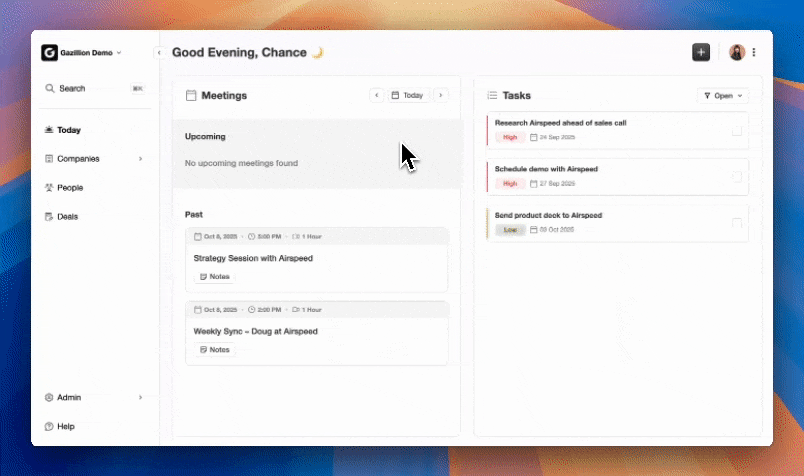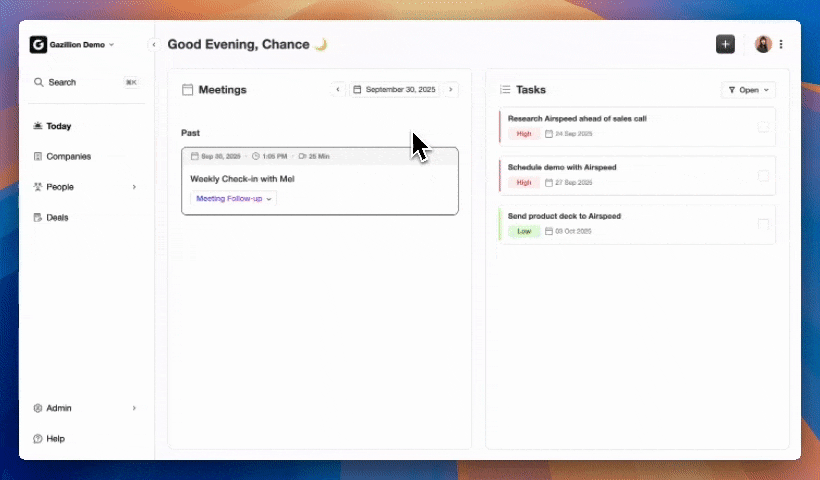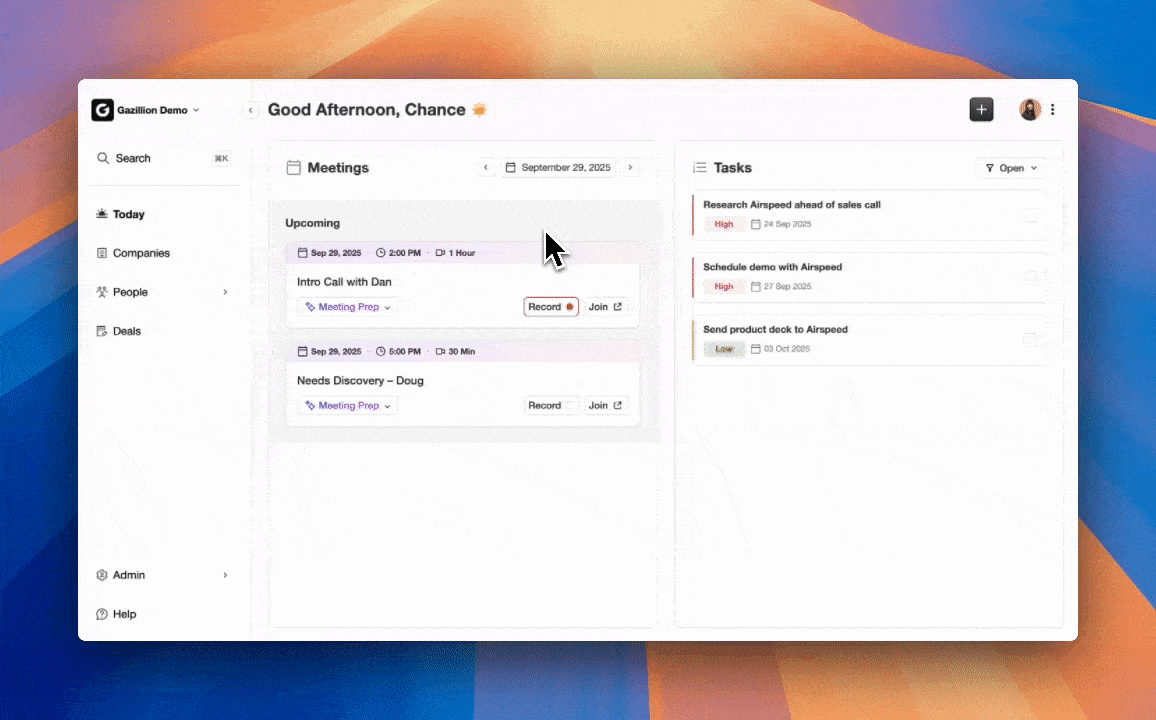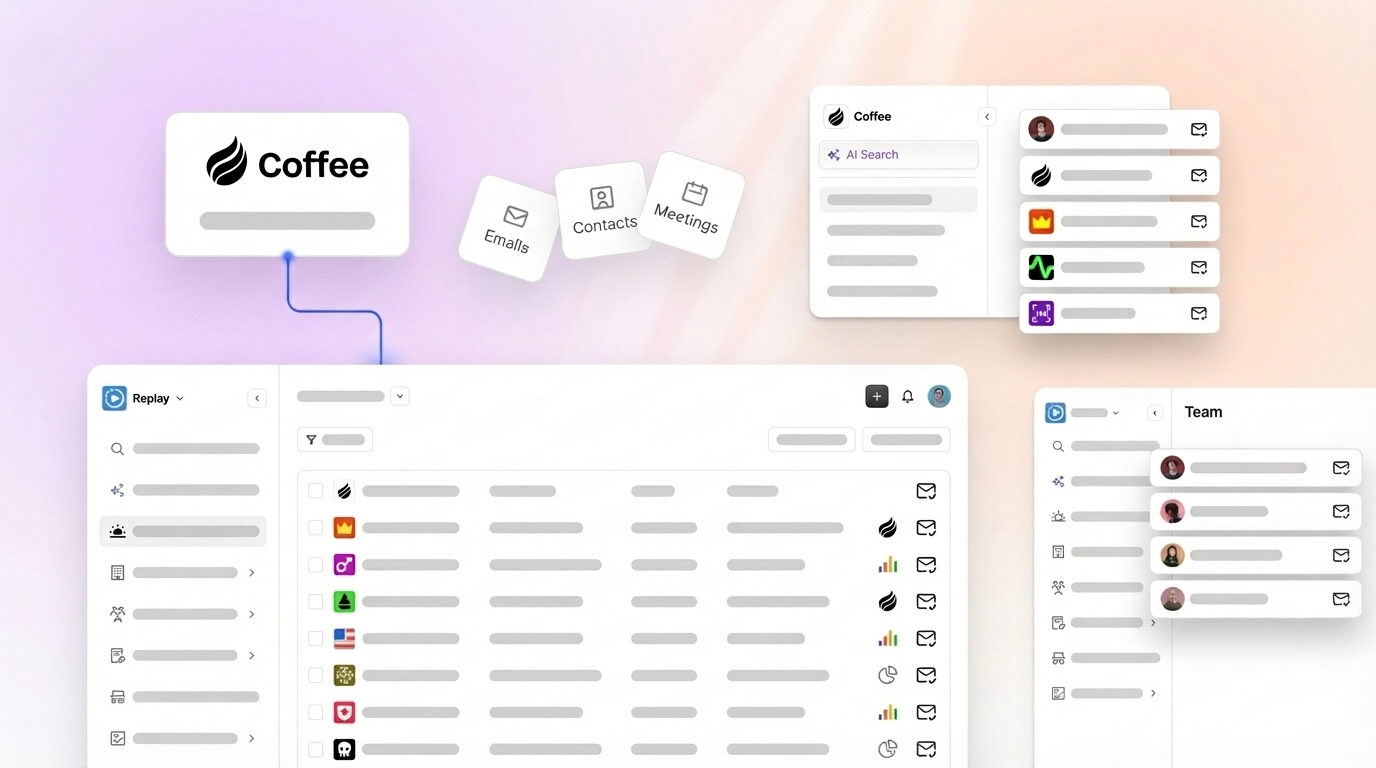Key Takeaways
- Sales teams in 2026 still lose significant time to manual data entry and fragmented tools, which reduces time available for actual selling.
- AI sales software turns CRMs from passive databases into active agents that capture data, enrich records, and surface timely insights.
- Agent-led platforms like Coffee reduce administrative work, improve data quality, and connect email, calendar, meetings, and pipeline reviews in one workflow.
- Specialized AI tools support prospecting, email outreach, meeting intelligence, coaching, and sales engagement, so the best stack depends on your sales motion and existing systems.
- Coffee provides an autonomous CRM agent that handles data entry, meeting workflows, and pipeline visibility. Get started with Coffee and see their pricing and plans to see how it can support your team.
The AI-Powered Sales Revolution: Why Now is the Time to Upgrade Your Stack
Sales teams face a productivity ceiling when representatives spend most of their week updating CRMs instead of selling. One analysis found that 71% of sales reps’ time goes to data entry, leaving only 35% for actual selling.
Agent-led AI tools now capture, enrich, and analyze information from email, calendar, calls, and web activity with minimal manual effort. These agents already automate prospecting, copywriting, sequencing, and content creation, which moves CRMs from simple storage to active systems that keep data accurate and generate useful recommendations.
Introducing Coffee: The Agent-Led Solution That Solves Your CRM Problem
Coffee focuses on the core CRM problem: representatives do not want to spend time on data entry. The Coffee agent automatically unifies data, handles tasks, and captures notes so the CRM stays accurate without extra work from the team.
Coffee scans email and calendars to auto-create contacts and companies, log activities, and enrich records with job titles, funding information, and LinkedIn profiles. Teams often save 8–12 hours per week per rep because routine updates happen in the background.
The platform also manages the full meeting lifecycle. Coffee can join calls as an AI bot, provide pre-meeting briefings, generate summaries, identify next steps, and draft follow-up emails. Pipeline Intelligence and Compare views track changes over time, so pipeline reviews focus on strategy instead of manual inspection.

Coffee can run as a Standalone AI-First CRM for small and mid-sized businesses or as a Companion App that sits on top of Salesforce or HubSpot. This setup replaces several point tools with one agent-led platform while preserving your existing system of record.
Get started with Coffee to see how autonomous CRM management works in practice.
The Top 10 Best AI Sales Software Solutions for 2026
1. Coffee: Autonomous CRM Agent for Clean Data and Workflow Automation
Coffee serves as an AI-first CRM or companion layer that removes manual data entry and fragmented workflows. It auto-creates and enriches records, logs activities, manages meeting prep and summaries, and compares pipeline changes over time. A natural language list builder lets users request segments such as “Find VPs of Sales in North America at companies with $10M+ funding using Salesforce.”

2. Regie.ai: AI Sales Suite for Outbound Orchestration
Regie.ai operates as an AI sales engagement platform with agents for prospecting, copywriting, sequencing, inbound handling, and web content. Teams use it to scale outbound sequences and maintain consistent messaging, though its integrations remain narrower than full CRM platforms.
3. Avoma: AI Meeting Assistant for Revenue Intelligence
Avoma focuses on meetings with AI-based performance scoring, topic detection, live bookmarking, keyword tracking, transcription, and summaries. It integrates with major CRMs and video platforms, giving managers detailed insight into conversations and coaching opportunities.
4. Salesforce Einstein: Embedded AI in Salesforce
Salesforce Einstein adds AI lead scoring, opportunity scoring, activity capture, and forecasting inside Sales Cloud. It helps teams prioritize deals and forecast more accurately, but still depends on the quality of data entered into Salesforce, which makes pairing it with an automation layer like Coffee valuable.
5. Gong.io: Conversation and Revenue Intelligence
Gong.io records, transcribes, and analyzes sales calls to highlight trends, coaching moments, and deal risk, and holds a 4.8/5 G2 rating. Sales leaders rely on its call analysis and deal intelligence to refine messaging and improve forecast confidence, provided that calls are consistently recorded.
6. Lavender: Real-Time AI Email Coaching
Lavender runs inside the inbox to score emails on tone, structure, and personalization, then suggests edits in real time. Teams use it to improve reply rates and train reps on effective outreach patterns without leaving their email client.
7. Clay: Lead Sourcing and Data Enrichment at Scale
Clay automates the discovery and enrichment of leads from multiple data sources to build targeted prospect lists. Sales and growth teams use its scraping and enrichment workflows to assemble detailed contact profiles for highly specific outbound campaigns.
8. Salesloft: AI-Guided Sales Engagement
Salesloft coordinates multi-channel cadences and uses its AI Rhythm feature to prioritize activities. Representatives manage email, calls, and social touchpoints from one interface, while managers track engagement and performance across complex sequences.
9. Trellus.AI: AI Roleplay and Live Coaching for SDRs
Trellus.AI delivers realistic sales roleplay plus live coaching during calls through a Chrome-based experience. SDRs gain targeted feedback as they practice or work live, which helps teams ramp faster and standardize talk tracks.
10. SetSail: AI Sales Intelligence for Data Completion and Signals
SetSail fills gaps in CRM data, surfaces buying signals, and measures performance with more granularity than standard reports. Teams integrate it with existing CRMs to strengthen data completeness and highlight behaviors that correlate with closed revenue.

How Leading AI Sales Software Compares to Traditional CRMs
|
Feature/Benefit |
Coffee (AI-First) |
Traditional CRMs |
Point Solutions |
|
Data Entry |
Automated by AI agent |
Manual input by reps |
Limited sync or manual |
|
Workflow Management |
Agent-orchestrated and consolidated |
Fragmented, multiple tools |
Niche-specific focus |
|
Pipeline Intelligence |
Proactive, agent-driven insights |
Reactive, manual effort required |
Limited to specific interactions |
|
User Experience |
Helpful co-pilot for reps |
Choresome database |
Another tool to manage |
Get started with Coffee to compare agent-led automation with your current CRM experience.
Conclusion: Make 2026 the Year You Automate Sales Success with AI
Manual data entry, scattered tools, and low CRM adoption continue to limit sales productivity, even as teams face higher quotas and more stakeholders in every deal. AI sales software offers a practical way to shift that work from humans to systems.
Coffee addresses this shift directly by acting as an autonomous CRM agent that handles data hygiene, meeting workflows, and pipeline visibility as either a Standalone AI-First CRM or a Companion App for Salesforce and HubSpot. Teams keep their existing stack while removing much of the administrative burden.
Organizations that adopt agent-led automation in 2026 can expect better data, more selling time, and more predictable revenue. Get started with Coffee to put an AI agent at the center of your sales operations.
Frequently Asked Questions (FAQ) About AI Sales Software
How does AI sales software solve the “bad data in, bad data out” problem of legacy CRMs?
AI sales software reduces human error by automating data capture, enrichment, and logging. Agent-led tools like Coffee pull information from email, calendars, and call transcripts, then structure it consistently, which gives reporting and forecasting a more reliable foundation than manual entry.
Is AI sales software secure, and how is my data used?
Leading AI sales platforms invest in security frameworks such as SOC 2 Type 2 and GDPR compliance and apply strict access controls. Responsible providers keep customer data isolated from public model training and limit its use to operating and improving the contracted services.
Can AI sales tools integrate with my existing CRM, like Salesforce or HubSpot?
Many AI tools connect directly to major CRMs. Coffee’s Companion App, for example, sits on top of Salesforce or HubSpot to handle data input and enrichment, so the underlying system of record stays accurate while users work through a simpler, AI-driven interface.
What is the biggest time-saving benefit of implementing AI sales software for my team?
Time savings mainly come from removing manual CRM updates, activity logging, and follow-up drafting. When AI agents create and enrich records and handle routine communication, representatives typically regain multiple hours per week for discovery, demos, and closing work.
How quickly can my team see results from implementing AI sales software?
Most teams see cleaner data and less administrative work within the first week as automation turns on. Broader performance improvements usually emerge over 30–90 days, once workflows adjust and managers begin using AI-driven insights to guide strategy and coaching.
